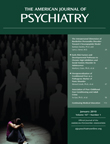Specific and Generalized Neuropsychological Deficits: A Comparison of Patients With Various First-Episode Psychosis Presentations
Abstract
Objective
Overwhelming evidence suggests that compromised neuropsychological function is frequently observed in schizophrenia. Neurocognitive dysfunction has often been reported in other psychotic disorders, although there are inconsistencies in the literature. In the context of four distinct diagnostic groups, the authors compared neuropsychological performance among patients experiencing their first psychotic episode.
Method
Data were derived from a population-based, case-control study of patients with first-episode psychosis. A neuropsychological test battery was administered to patients with a diagnosis of schizophrenia (N=65), bipolar disorder or mania (N=37), depressive psychosis (N=39), or other psychotic disorders (N=46) following index presentation, as well as to healthy comparison subjects (N=177). The presence of specific and generalized cognitive deficits was examined.
Results
The schizophrenia group presented widespread neuropsychological impairments and performed significantly worse than healthy comparison subjects on most neuropsychological measures. Patients with other psychotic disorders and depressive psychosis also demonstrated widespread impairments. Deficits in patients with bipolar disorder or mania were less pervasive but evident in performance scores on verbal memory and fluency tests. Differences between the four patient groups and healthy comparison subjects and among the patient groups were attenuated after controlling for differences in general cognitive ability (IQ).
Conclusions
Early in their course, cognitive deficits are present in all psychotic disorders but are most severe and pervasive in schizophrenia and least pervasive in bipolar disorder and mania.



